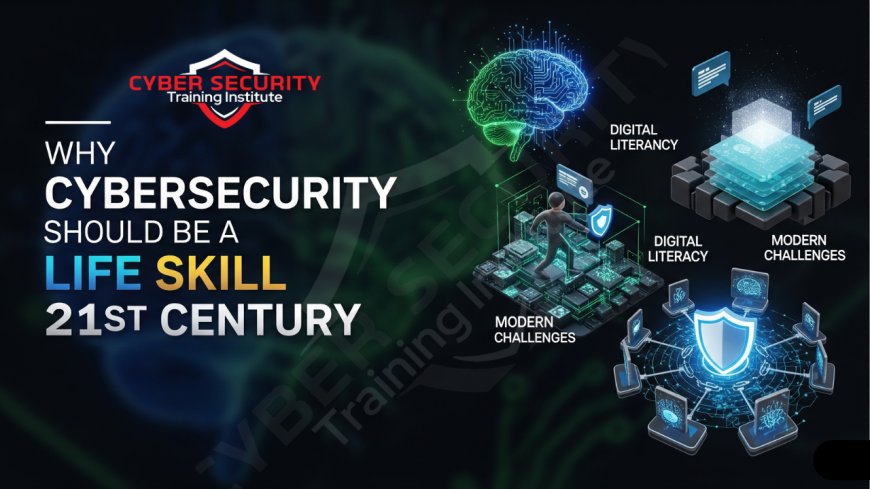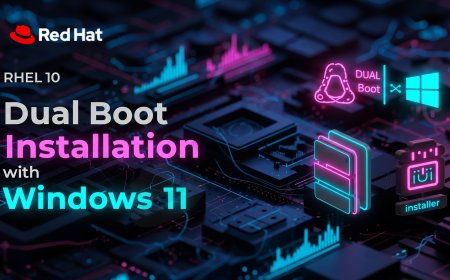Why Cybersecurity Should Be a Life Skill in the 21st Century
In today’s world, where we shop online, connect with friends on social media, and store sensitive information in the cloud, the digital landscape is as much a part of our lives as the physical one. But with this convenience comes a hidden danger: cyber threats. From phishing scams to data breaches, the risks are real and growing. Imagine losing your savings to a hacker or having your personal photos exposed online—it’s a nightmare no one wants to face. Cybersecurity, once thought to be the domain of tech experts, is now something everyone needs to understand. Just like learning to cook or manage money, knowing how to protect yourself online is a critical life skill in the 21st century. This blog explores why cybersecurity matters to everyone, how it impacts daily life, and practical steps you can take to stay safe.

Table of Contents
- The Digital Age and Its Risks
- Why Cybersecurity Is for Everyone
- Common Cyber Threats You Should Know
- Practical Cybersecurity Skills for Everyday Life
- The Role of Education in Cybersecurity
- Conclusion
- Frequently Asked Questions (FAQs)
The Digital Age and Its Risks
We live in an era where technology is woven into nearly every aspect of our lives. From smartphones to smart homes, we rely on digital tools for communication, work, and entertainment. But this connected world comes with risks. Cybercriminals exploit vulnerabilities in our devices, apps, and even our behavior to steal data, money, or identities.
In 2023, over 2.6 billion personal records were exposed worldwide due to data breaches. That’s not just a number—it’s people’s bank details, health records, and personal emails. The average person might think, “I’m not a target; I’m not important enough.” But that’s a myth. Cybercriminals don’t discriminate—they target anyone who’s unprepared. Whether it’s a phishing email tricking you into sharing your password or malware sneaking onto your phone, the consequences can be devastating.
The digital age has made life more convenient, but it’s also made us more vulnerable. Understanding cybersecurity helps you navigate this world safely, protecting your personal and financial well-being.
Why Cybersecurity Is for Everyone
Cybersecurity isn’t just for IT professionals or big corporations. It’s for students, parents, small business owners, and retirees—anyone who uses a device connected to the internet. Here’s why it’s a life skill everyone needs:
- Protecting Personal Information: Your name, address, and credit card details are valuable to cybercriminals. A single mistake, like reusing a weak password, can lead to identity theft.
- Financial Security: Online banking and shopping are convenient, but they’re also targets for hackers. Knowing how to spot scams can save you from losing your hard-earned money.
- Privacy Matters: Social media platforms collect and share your data. Cybersecurity skills help you control what you share and who sees it.
- Future-Proofing Your Life: As technology advances, so do cyber threats. Learning cybersecurity now prepares you for a world where AI-driven scams and deepfakes are becoming common.
Think of cybersecurity like locking your front door. You don’t need to be a locksmith to keep your home safe—just know how to use the lock. Similarly, basic cybersecurity knowledge empowers you to protect yourself in the digital world.
Common Cyber Threats You Should Know
To stay safe, you need to know what you’re up against. Here are some common cyber threats explained in simple terms, along with their potential impact:
| Threat | Description | Impact |
|---|---|---|
| Phishing | Fake emails, texts, or websites that trick you into sharing personal information like passwords or bank details. | Can lead to identity theft, financial loss, or unauthorized account access. |
| Malware | Malicious software (like viruses or ransomware) that infects your device, often through downloads or shady links. | Can lock your files, steal data, or damage your device. |
| Password Attacks | Hackers guess or steal passwords to access your accounts, often because of weak or reused passwords. | Loss of account control, stolen data, or financial fraud. |
| Social Engineering | Tricks that manipulate you into revealing sensitive information, like pretending to be a trusted company. | Can compromise personal or work-related accounts. |
| Data Breaches | When hackers access a company’s database, exposing users’ personal information. | Exposes your data to criminals, leading to potential fraud or blackmail. |
These threats aren’t just technical problems—they affect real people. For example, a phishing scam could drain your bank account, while a data breach might expose private photos. Knowing these risks is the first step to protecting yourself.
Practical Cybersecurity Skills for Everyday Life
You don’t need a degree in computer science to stay safe online. Here are practical, beginner-friendly cybersecurity habits you can adopt today:
- Use Strong Passwords: Create passwords with at least 12 characters, mixing letters, numbers, and symbols. Avoid using the same password for multiple accounts.
- Enable Two-Factor Authentication (2FA): This adds an extra step to logins, like a code sent to your phone. It’s like a second lock on your digital door.
- Be Cautious with Emails and Links: Don’t click links or download attachments from unknown senders. Check the sender’s email address carefully for typos or odd domains.
- Keep Software Updated: Regular updates patch security holes in your apps and devices. Turn on automatic updates whenever possible.
- Use Secure Wi-Fi: Avoid public Wi-Fi for sensitive tasks like banking. If you must use it, a virtual private network (VPN) encrypts your connection.
- Back Up Your Data: Regularly save important files to an external drive or secure cloud service. This protects you from ransomware or device failure.
- Learn to Spot Scams: If an offer seems too good to be true (like a free iPhone), it probably is. Trust your instincts and verify before acting.
These habits are like brushing your teeth—small actions that make a big difference over time. Start with one or two, and gradually build your cybersecurity routine.
The Role of Education in Cybersecurity
Just as schools teach math or reading, cybersecurity should be part of education at all levels. Kids as young as elementary school age use devices, making them targets for scams or inappropriate content. Teaching them early about safe online behavior—like not sharing personal details or clicking suspicious links—sets them up for a secure digital life.
For adults, workplaces and community programs can offer training. Many companies now include cybersecurity in employee onboarding, covering topics like spotting phishing emails or securing company devices. Free online resources, like those from cybersecurity organizations, also provide beginner-friendly courses.
Governments and schools have a role too. Some countries have started integrating cybersecurity into school curriculums, recognizing its importance. For example, teaching students how to create strong passwords or recognize fake websites equips them to handle real-world threats. Lifelong learning in cybersecurity ensures we stay ahead of evolving risks.
Conclusion
Cybersecurity is no longer optional—it’s a necessity for navigating the 21st century. From protecting your finances to safeguarding your privacy, knowing how to stay safe online empowers you to thrive in the digital age. By understanding common threats like phishing and malware, adopting simple habits like strong passwords and 2FA, and supporting education efforts, you can take control of your digital security. Cybersecurity isn’t about being paranoid; it’s about being prepared. Start small, stay curious, and make cybersecurity a part of your everyday life. Your future self will thank you.
Frequently Asked Questions (FAQs)
What is cybersecurity?
Cybersecurity is the practice of protecting your devices, data, and online accounts from unauthorized access or attacks.
Why do I need to care about cybersecurity?
Anyone using the internet is a potential target for cybercriminals. Cybersecurity protects your money, privacy, and personal information.
What’s the easiest way to stay safe online?
Use strong, unique passwords and enable two-factor authentication (2FA) on your accounts.
What is phishing?
Phishing is when cybercriminals send fake emails, texts, or websites to trick you into sharing sensitive information.
How can I spot a phishing email?
Look for typos, strange sender addresses, or urgent requests for personal information. Don’t click links or attachments from unknown sources.
What is two-factor authentication (2FA)?
2FA adds an extra step to logins, like a code sent to your phone, making it harder for hackers to access your accounts.
Why are strong passwords important?
Weak passwords are easy for hackers to guess or crack, putting your accounts at risk.
How long should my password be?
Aim for at least 12 characters, mixing letters, numbers, and symbols for maximum security.
Can I reuse passwords across different accounts?
No, reusing passwords makes it easier for hackers to access multiple accounts if one is compromised.
What is malware?
Malware is harmful software, like viruses or ransomware, that can steal data or damage your device.
How do I avoid malware?
Avoid downloading files or clicking links from unknown sources, and keep your software updated.
Is public Wi-Fi safe to use?
Public Wi-Fi can be risky. Use a VPN to encrypt your connection, especially for sensitive tasks like banking.
What is a VPN?
A virtual private network (VPN) encrypts your internet connection, making it harder for hackers to intercept your data.
Should I back up my data?
Yes, regular backups protect your files from ransomware or device failure. Use an external drive or secure cloud service.
What’s a data breach?
A data breach is when hackers access a company’s database, exposing users’ personal information like emails or passwords.
How can I protect my social media accounts?
Use strong passwords, enable 2FA, and be cautious about what you share publicly.
Are free antivirus programs effective?
Many free antivirus programs offer basic protection, but paid versions often provide more comprehensive security.
Can kids learn cybersecurity?
Yes, kids can learn simple habits like not sharing personal details online or avoiding suspicious links.
How do I know if a website is secure?
Look for “https://” and a padlock icon in the browser’s address bar, indicating a secure connection.
Why is cybersecurity education important?
Education equips people with the knowledge to recognize and avoid cyber threats, making the internet safer for everyone.
What's Your Reaction?
 Like
0
Like
0
 Dislike
0
Dislike
0
 Love
0
Love
0
 Funny
0
Funny
0
 Angry
0
Angry
0
 Sad
0
Sad
0
 Wow
0
Wow
0






![How to Install RHEL 10 on VMware/VirtualBox [Tutorial]](https://www.cybersecurityinstitute.in/blog/uploads/images/202509/image_430x256_68b56dc967a4a.jpg)








